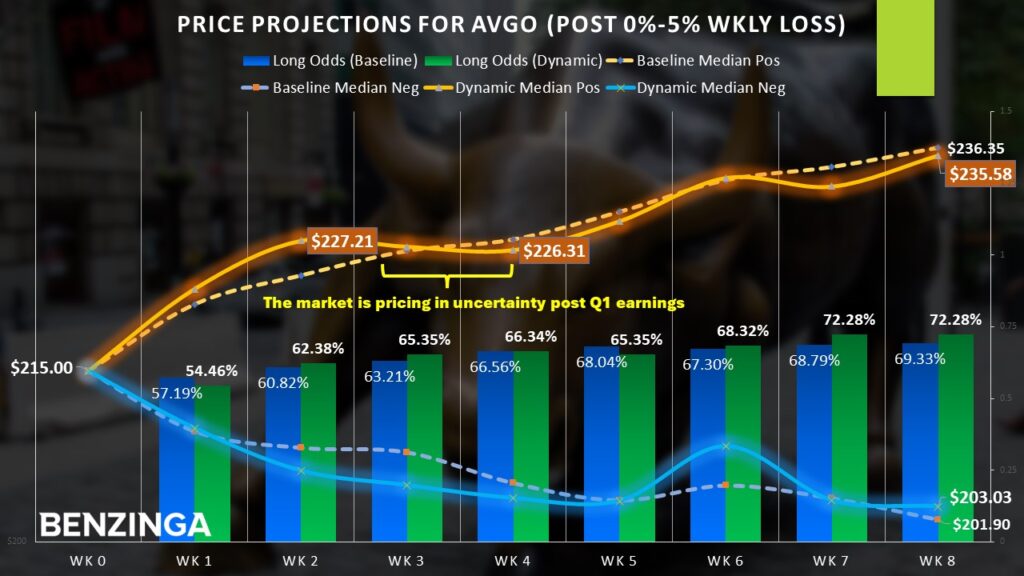Zinger Key Points
- Several investors have trimmed their exposure to Broadcom as Intel unit buyout speculation circulates.
- Historically, bulls tend to view dips in AVGO stock as buying opportunities, presenting an enticing trading idea.
- Markets are swinging wildly, but for Matt Maley, it's just another opportunity to trade. His clear, simple trade alerts have helped members lock in gains as high as 100% and 450%. Now, you can get his next trade signal—completely free.
Ranking among the major players in the infrastructural arena of artificial intelligence, Broadcom Inc. AVGO essentially provides the backbone for data centers. Primarily, its products undergird networking, custom accelerator and storage solutions. However, concerns related to a possible buyout of the chip design and marketing business of Intel Corp. INTC has seen AVGO stock decline conspicuously. Ultimately, though, history has proven such dips tend to spark buying activity.
From a fundamental perspective, Broadcom has garnered a reputation for its ability to acquire, integrate and extract value from major acquisitions. Notably, the tech giant bought out VMware, at the time a leading cloud computing and virtualization company. Broadcom rebranded the acquired firm and incorporated it into its existing infrastructure and security software solutions unit. Still, the latest report puts this reputation to the test.
Early last week, the Wall Street Journal reported that Broadcom has been analyzing the viability of acquiring Intel's chip design and marketing unit. On the other end, Taiwan Semiconductor Manufacturing Co. TSM is exploring the prospect of acquiring Intel's chip plants. Broadcom and TSMC are not working together and the talks remain preliminary.
Nevertheless, the prospect of Broadcom buying a component of Intel's business worried several investors. Among the major tech players, Intel has lagged the competition through a variety of missteps and self-inflicted wounds. Naturally, a possible deal would raise concerns about integration challenges and broader financial implications.
Investors Usually Come Around to Bolster AVGO Stock
While circumstances aren't particularly favorable for AVGO stock at the moment, traders should note that historically, the security benefits from an upward bias. To be clear, this framework doesn't guarantee long-side success. Generally speaking, though, bullish traders — based on prevailing trends — are likelier to be rewarded for their acquisitiveness. What's more, investors tend to view dips in AVGO as buying opportunities.
Let's consider the raw numbers. Using data from January 2019, a position entered in AVGO stock at the beginning of the week has around a 57% chance of rising by the end of it. Over an eight-week period, this baseline probability varies but eventually culminates in long odds of approximately 69%. Again, traders who adopt a bullish perspective are more aligned with AVGO's natural rhythm.
What's really interesting is that this behavior tilts even more favorably for the bulls whenever AVGO encounters volatility. Last week, the equity lost just under 5%. Under similar circumstances, the subsequent week following the negative anchor event sees long odds dip below the baseline probability to approximately 54%. Therefore, it's not surprising that this week started off in the red.

Nevertheless, based on past data, the dynamic long odds (accounting for data within specific parameters) from the second week onward tend to rise above the baseline probability. Stated differently, investors eventually buy the discount in AVGO stock.
To reiterate, history isn't guaranteed to repeat itself. However, AVGO stock may be one of the more reliable trading ideas to bet on because it's so heavily traded. In other words, the pricing behavior is a tad more predictable. Case in point is AVGO's behavior under extreme volatility. Back when the DeepSeek impact cratered tech stocks, AVGO followed a predictable pattern, which appears to have only been undone by the aforementioned Intel buyout report.
Back At The Wheel Again
In anticipation of Broadcom stock eventually bouncing back from its downward spell, aggressive traders can target long-side options strategies for derivatives expiring March 7. Historically, AVGO tends to post a median return of around 5.7% two weeks following a five-day period of modest volatility, assuming the materialization of the positive scenario.
With this forecast in mind, speculators may look to the 220/225 bull call spread. This transaction involves buying the $220 call and simultaneously selling the $225 call, using the proceeds from the short call to partially offset the debit paid of the long call. Granted, this setup caps the upside reward at the $225 short call strike price. However, the benefit is that the net transaction is significantly cheaper than buying the $220 call outright.
One wrinkle to consider is that Broadcom will disclose its first-quarter earnings report on March 6. As such, market makers are likely pricing in a volatility crush, which may be why the same 220/225 bull spread expiring March 21 features the same net debit cost — which is $210 at time of writing — as the earlier-expiring spread.
Ultimately, the deciding factor will come down to the trader's perspective and risk tolerance. Still, for speculators seeking to extract a quick profit, the March 7 spread may be more attractive, especially in mitigating opportunity costs from an unnecessarily lengthy spread.
Edge Rankings
Price Trend
© 2025 Benzinga.com. Benzinga does not provide investment advice. All rights reserved.
Trade confidently with insights and alerts from analyst ratings, free reports and breaking news that affects the stocks you care about.